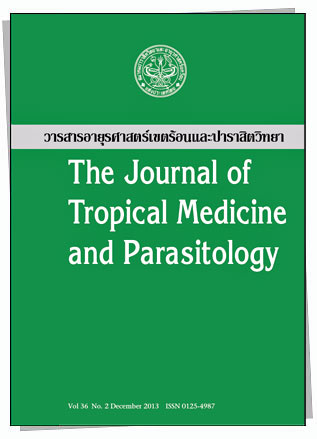Factors Associated with Malaria Infection in Vibhavadi District, Surat Thani Province, Southern Thailand
Main Article Content
Abstract
This research aimed to identify the factors associated with malaria infection in Vibhavadi District, Surat Thani Province. A cross-sectional study was performed to determine the relationship between groups of malaria infection and non-malaria infection during June to December 2010. Eighty-eight samples of malaria infection group and 176 samples of non-malaria infection group were drawn from malaria clinic in Vibhavadi District, Surat Thani Province, Southern Thailand. Data collected were the results of blood test and face-to-face interviews. Multiple logistic regressions were used to analyze for risk factors of malaria infection. The results showed that the factors significantly associated with malaria infection at 95% confidence level were as follows: occupation (AOR = 0.40, 95% CI = 0.22-0.72, P-value = 0.00), education (AOR = 1.89, 95% CI = 1.05-3.39, P-value = 0.03), duration of living in the area (AOR = 2.15, 95% CI = 1.14-4.05, P-value = 0.02), and stayed out of their own residence (AOR = 2.71, 95% CI = 1.26-5.86, P-value = 0.01). The risks might be reduced by community-based health education with emphasis on malaria, targeted to comparatively highrisk groups of people. Further study could assess effects of such prevention and control measures on malaria, in the same locality.

